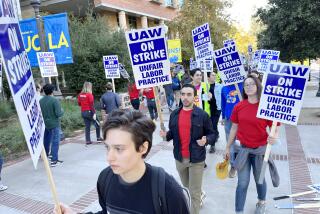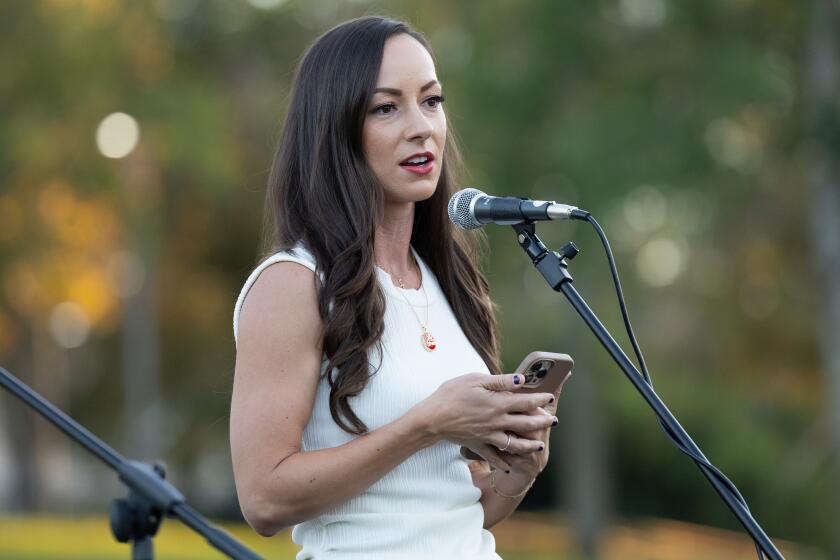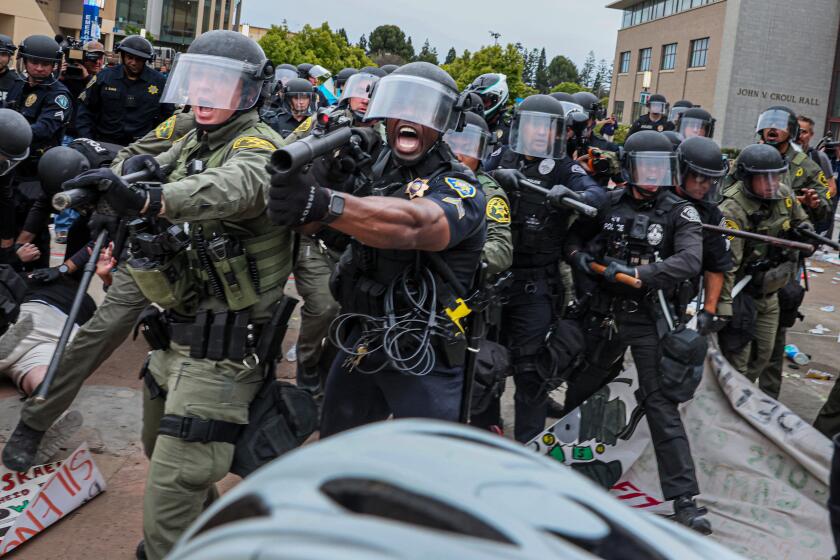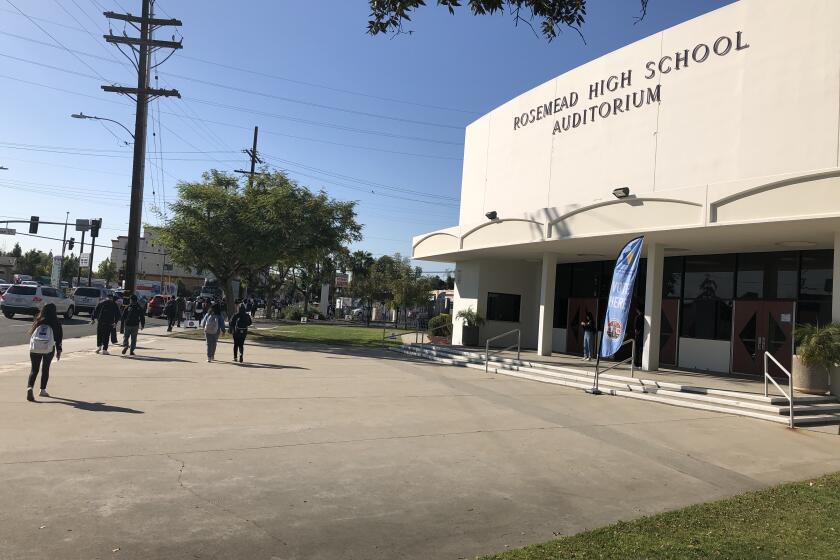Parents, Students Voice Concerns About Impact of Possible Walkout
Across the Los Angeles Unified School District on Friday, nervous parents and students held anguished philosophical wrestling matches as they pondered the decision of teachers to authorize a strike.
Struggling to make sense of doomsday pronouncements by the teachers union and school board members--the kind of threatening rhetoric that colors most labor disputes--parents and students interviewed at several schools were sharply split over whether they would support a strike.
Strong community backing for teachers was regarded as a crucial factor in a successful 1989 strike that won educators salary increases of 24% over three years. The current dispute is more perplexing: Whether teachers should strike in an effort to force the cash-drained district to soften a 9% pay cut.
“The children are the ones who are going to suffer,” said Barbara Gaines, whose granddaughter attends Washington Preparatory High School in South Los Angeles. “It’s devastating for them. If they are out for a while, their grades are going to drop, and they’ll lose their momentum. It’s psychological.
“I know the teachers are frustrated; I can understand that, but I hate this,” Gaines said. “It’s the children who are going to lose out. And they’re going to bed at night concerned about what is going to happen.”
Gaines said she also worries that a strike would encourage idle youngsters to commit crimes.
“What are they going to do, hang out? There’s not enough to keep them busy. It would create a dangerous situation. . . . We’re hoping and praying that things work out.”
In Westchester, parent Virgie Rowe was more sympathetic toward teachers.
“I hate to see them go out on strike, but I can understand what they’re doing. It’s the cost of living. I would do it too,” said Rowe, who was at Westchester High School on Friday trying to enroll her 15-year-old son, a Venice High School student who has been threatened by gang members.
Teachers are “getting a raw deal,” Rowe said. “There’s gangs and nobody there to protect them. Their lives are on the line. . . . God knows, I don’t want to see them out on strike, but if it makes it better for them, I’m all for it.”
Another parent, Dorothy Harris of Sherman Oaks, said she would keep her son, Shaka, out of classes at Millikan Junior High School if it would help striking teachers make their point.
“If the teachers are not happy, then it will affect them in the classroom,” she said. “Teachers, like everyone else, work to earn a living.”
Although students have expressed opposition to budget cuts by periodically demonstrating in recent months, most students interviewed Friday were worried more about the personal consequences of a strike.
“It’s going to be terrible because the students are not going to have classes; they’ll stay home and be bored,” said Rosalinda Bello, a 15-year-old at Jefferson High School.
Westchester High senior Gina Mishler, who worried that her application to Loyola Marymount University might be slowed, said she felt trapped.
“I’m worried it’s going to affect my grades if they have a strike. . . . I think it’s unfair, but I think the teachers have a right to fight for what they believe in. They have kids and families to feed,” she said.
Mishler, who said her mother kept her home from Orville Wright Junior High School during the 1989 strike, said she was not troubled by warnings from some school board members that a strike would trigger violence at schools.
“The Los Angeles riots involved the community and gangs. This is between teachers and the district. They’re more mature, hopefully. I don’t think there will be any problems,” she said.
Lisa Bravo, a ninth-grader at San Fernando Junior High School, said that teachers deserve more money and that better salaries may improve their motivation.
“I think teachers here try to teach,” she said.
At Glassell Park School, a well-maintained campus in Northeast Los Angeles, parents were attending an achievement awards assembly with their children and picking up boxes of chocolate bars for a fund-raising drive for field trips. Principal Richard Warnick was playing the piano and leading the assembly in songs and cheers.
Strike talk, however, was in the background.
Jisela Sahagun, the parent of a first-grader, said she is torn between knowing that the teachers need more money and worrying about extra baby-sitting bills if there is a strike. “We’re in the middle,” said Sahagun, who works as a manufacturing manager in the downtown garment district. “That’s the mothers’ problem, and we don’t know what to do. It’s not fair for the teachers, but it will be hard for us too.”
Glassell parent Carmen Gamez said if there is a strike, she will keep her two children--a son in second grade and a daughter in third grade--at home.
“It won’t be strict enough at school without the teachers,” she said. “The children will be wasting time. It will be better for them to stay home and for me to help them with their work.”
Anacelia Ruiz, who has a daughter at Glassell Park School and a son at Franklin High School, said the boy recently changed his goal of becoming a teacher.
“He told me, ‘I don’t want to be a teacher now because teachers don’t have so good a future,’ ” Ruiz said.
Ruiz said she strongly supports the teachers’ opposition to the pay cut.
“The teachers need all the money they can get. They have houses and families to support too,” she said. “If the President has money for all these other countries, why not our country, our schools?”
Teachers continued to make their case Friday.
Sylvia Crockett, a sixth-grade teacher at Hooper Street Elementary School in South Los Angeles, said she did not honor her union’s picket line in 1989 but will join the strike if it comes this time.
District officials “don’t leave me any choice. I’m barely surviving,” said Crockett, a single mother of three.
Crockett said the proposed pay cut sends the wrong message to students.
“We tell students, ‘Educate yourself, and you can do anything.’ But it’s like we’re lying to them. No one seems to care about what happens to these children. When I look at them, I’m afraid,” Crockett said.
Times staff writers Bob Baker, Larry Gordon and Julio Moran contributed to this story.
More to Read
Start your day right
Sign up for Essential California for news, features and recommendations from the L.A. Times and beyond in your inbox six days a week.
You may occasionally receive promotional content from the Los Angeles Times.






